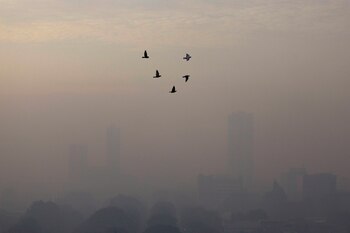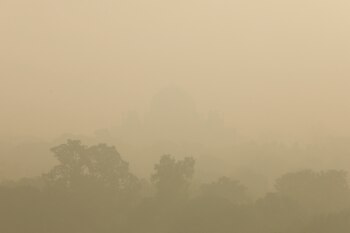
World Athletics continues to confront an issue that goes beyond sports: the air we breathe.
On Global Running Day, the international federation launched the “Every Breath Counts” campaign urging people to sign the Declaration for Clean Air. This initiative calls on governments and businesses to urgently agree to set more stringent targets and increase monitoring for air pollution in line with the World Health Organization (WHO) standards.
The WHO estimates 7 million people per year die as a result of air pollution.
World Athletics began tackling the air pollution crisis with its Air Quality project in 2018. Monitors were placed in stadiums and venues in Monaco, Addis Ababa, Sydney, Mexico City and Yokohama to collect data about sources of air pollution and the best ways to fight it.

World Athletics president Sebastian Coe said this new campaign is about “demanding better.”
”I want to live in a world where everyone can breathe clean air,” Coe said in a statement. “It’s a simple ask, but sadly it’s a race against time to get there. As a runner, I want to ensure that future generations can experience the same freedom and joy that I’ve felt throughout my life. Right now, we have a golden opportunity to come together to call for the change that we need to see in the world. Join the race for clean air before it really is too late.”
A World Athletics-commissioned survey in late May produced some alarming results. Polling 4,000 adults split equally across the United Kingdom, USA, France and India, 83 percent of the respondents said they believed access to clean air is a human right and 66 percent worried about air pollution levels affecting the younger generation’s ability to exercise outside.
In addition, 55 percent of the respondents said they would choose not to exercise if the air was unsafe, which 53 percent revealing they are scared about air pollution levels affecting their running or ability to exercise outside.

An overwhelming majority — 75 percent — want to tackle the air pollution crisis now, instead of being forced to adapt in years to come. However, those numbers varied among nations with 83 percent in India and only 64 percent in the United States.
World Athletics said polluted air “puts the 1.4 billion people who run on a regular basis at risk of serious health implications,” and notes the greater need for exercise than ever before in light of rising obesity rates and the negative global health impacts of the COVID-19 pandemic, poor diets and limited access to nutritious food.
Two-time Olympic champion David Rudisha of Kenya is among the notable athletes supporting “Every Breath Counts.”
”As an athlete, I know that the importance of clean air cannot be underestimated,” said Rudisha, the world record holder at 800 meters. “In Kenya, ambient air pollution is the fourth-biggest risk factor driving death and disability combined. It saddens me to think about how this will hinder the next generation of aspiring athletes, and how it’s already destroying the health of our people. I hope others will join together with us to campaign for urgent action to improve air quality.”
The situation is not as dire in Sweden, home of Kajsa Bergqvist, a three-time world high jump champion and Olympic bronze medalist. However, she was eager to come on board for the campaign.
”I am very lucky to have grown up in Sweden, which is one of the least polluted countries in the world,” Bergqvist said. “But sport is all about fairness, and it is deeply unjust that athletes in many parts of the world are hindered by poor air quality and face serious health implications in their pursuit of sporting achievement.
”It is imperative that we join together as a global community of athletes – and of people – to demand clean air everywhere.”

The survey found that 13 percent of people in the U.K. and USA can imagine a world in which it is unsafe to go outside and breathe air. That figure drops to nine percent in India and France.
Nearly half of those surveyed believe they have experienced asthmatic symptoms as a result of being exposed to air pollution, with 36 percent saying they have experienced black mucus when blowing their nose after visiting a city or heavily polluted area.
Unfortunately, 59 percent admitted they do not know the extent of poor air quality and were previously unaware that nine out of 10 people breathe air that exceeds WHO recommended limits. In India, 73 percent of people did know that fact, while the awareness level was only 19 percent in the USA.
Últimas Noticias
Sinner-Alcaraz, the duel that came to succeed the three phenomenons
Table tennis: Brazil’s Bruna Costa Alexandre will be Olympic and Paralympic in Paris 2024

Rugby 7s: the best player of 2023 would only play the medal match in Paris

Rhonex Kipruto, owner of the world record for the 10000 meters on the road, was suspended for six years

Katie Ledecky spoke about doping Chinese swimmers: “It’s difficult to go to Paris knowing that we’re going to compete with some of these athletes”





